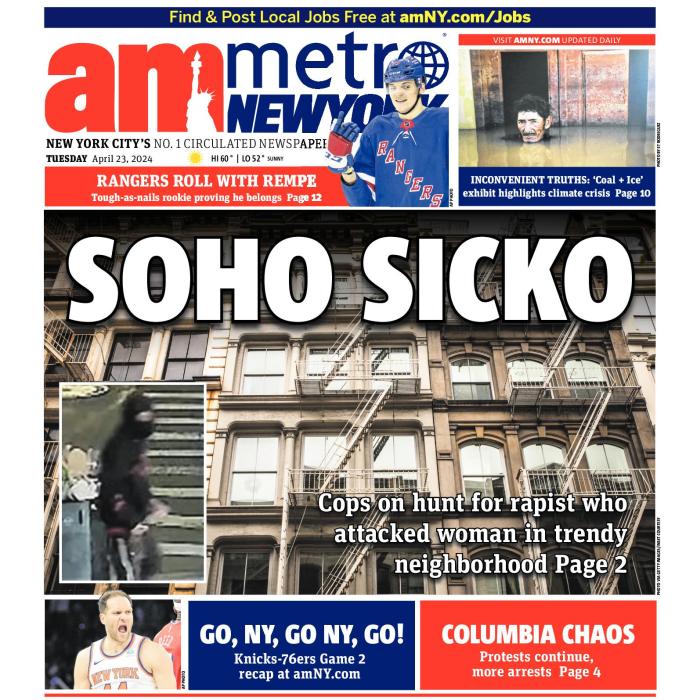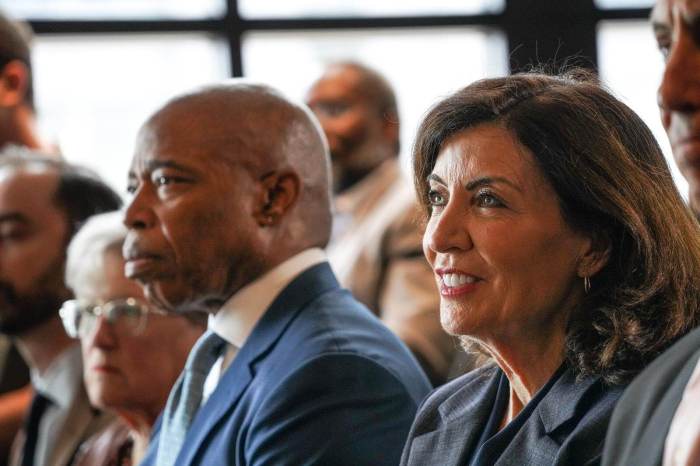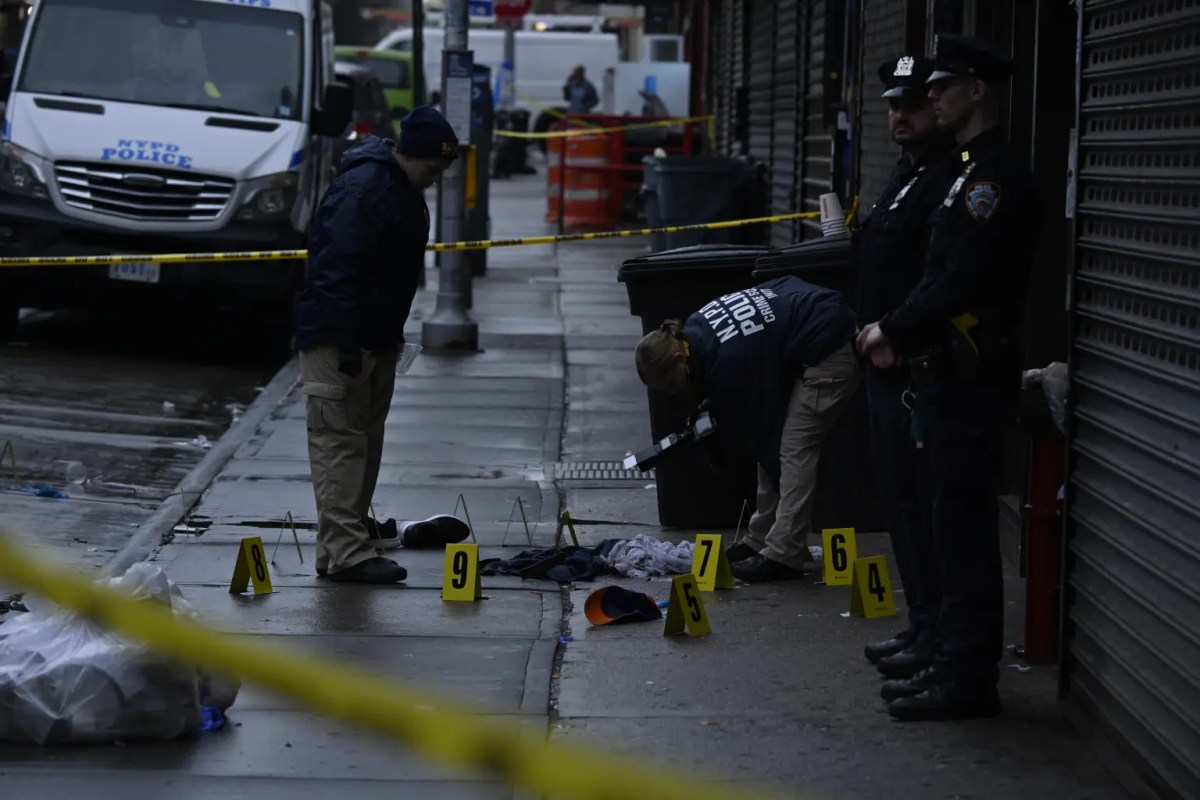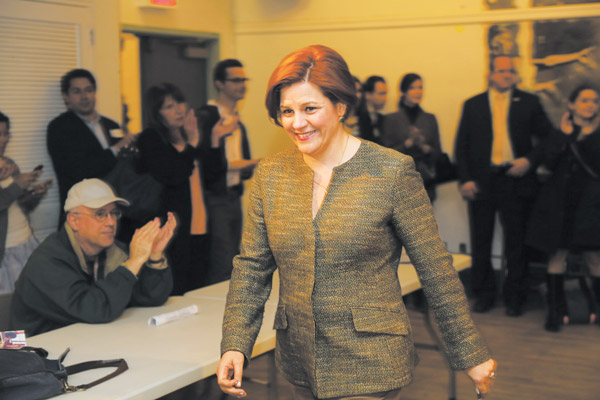
BY JEFFERSON SIEGEL | Four Democratic candidates for mayor were welcomed to the Village Monday night to offer their visions for the city. The forum, at the L.G.B.T. Center on W. 13th St., was sponsored by the Village Independent Democrats, Village Reform Democratic Club, Downtown Independent Democrats and several other clubs and groups.
The candidates who participated — City Council Speaker Christine Quinn, former Councilmember Sal Albanese, Comptroller John Liu and Public Advocate Bill de Blasio — didn’t meet face to face. The format allowed each candidate 10 minutes to state his or her case, followed by a 15-minute Q&A before departing the meeting.
Half an hour before the forum began, 10 Quinn supporters stood outside the Center holding signs and passing out fliers. Their presence foreshadowed the enthusiastic greeting Quinn would receive from a room filled with many longtime friends and supporters.
Before the forum began, District Leader Keen Berger admitted she was excited.
“I’m a political junkie,” she said. “The thing I care about and know the most about is education,” she noted, mentioning one of the many topics the candidates would expound on. Other issues dominating the evening’s conversation included affordable housing, stop-and-frisk, hydrofracking and the Spectra pipeline.
Several in the audience confessed to being undecided about whom to vote for. But West Village resident Ellen Peterson-Lewis had already made up her mind and was proudly sporting a “Christine Quinn” sticker on her dress.
“She is on the right track on women’s issues, education, affordable housing,” Peterson-Lewis said. When asked about Quinn’s vote to overturn the term limits law, giving Mayor Bloomberg and others in the Council — including Quinn — a third term, Lewis demurred.
“I think the term limits issue was a hot-button issue,” she said. “It’s a nonissue today.”
Attorney and former Council candidate Peter Gleason, however, expressed shock at the expressions of support for Quinn.
“This building stands in the shadow of St. Vincent’s,” he said, referring to the shuttered hospital. Nodding at the vocal Quinn supporters, he added, “If you know you’re walking into hostile territory, you bring a posse of supporters because perception is reality.”
Quinn didn’t get a single question on term limits or, for that matter, the other elephant in almost every room she’s debated in, potential mayoral candidate Anthony Weiner. She began her remarks with education; specifically, the accomplishment of getting the city to buy 75 Morton St.
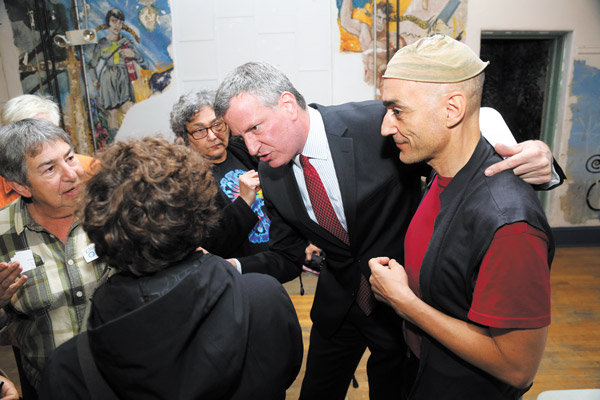
After speaking at Monday night’s mayor candidates forum, Bill de Blasio greeted audience members, including Little Italy activist Sante Scardillo, right, and Elaine Young, far left.
“It’s going to be the definition of what a 21st-century middle school will be,” she enthused.
Quinn touched on the necessity of providing affordable housing, updating the landmarking process and saving community gardens.
“We cannot let the Hudson River Park, in small ways, be taken away from us,” she said to cheers.
During the Q&A, Quinn admitted to having “concerns” about fracking and the Spectra pipeline but said she hasn’t made a final decision. She called the city’s Rent Guidelines Board a “kangaroo court” and said open areas, like parking lots, on New York City Housing Authority grounds should not be auctioned off for private development to the highest bidder.
In contrast to Quinn’s confidence, Sal Albanese’s tone was more measured. In a jab at Quinn, Albanese said he was not accepting contributions from developers. He called for universal pre-K in schools and for teachers to “stop teaching to the test.” If elected mayor, he would develop a “Department of Early Learning.”
Albanese zeroed in on the economy, saying he wants to incentivize businesses to hire more unemployed.
“We have politicians who spend more time at cocktail parties than listening to their citizens,” he said. “Our political system is flooded with big money.”
Asked about government tax incentives, Albanese said he’s no fan. The Barclays Center is a great place, he suggested, but the jobs and housing promised after its opening never materialized.
He lamented the loss of St. Vincent’s Hospital while promising, if elected, to provide healthcare in every neighborhood.
Asked about stop-and-frisk, Albanese said no one should be stopped in violation of the Constitution. As mayor, he would call for hiring 3,800 more police officers and work to establish better rapport with communities. He also proposed reform of the drug laws, calling marijuana arrests “ridiculous.”
Albanese admitted to being skeptical of selling off parcels in public housing complexes to pay for repairs to the existing buildings.
Asked about the term limits extension, Albanese bristled.
“I think it’s one of the most outrageous miscarriages of justice in the last 20 to 30 years,” he declared. He supports Bloomberg’s large-soda ban, but questioned the mayor’s priorities.
“We’ve got people who don’t have homes,” he said.
As he does at most public events, city Comptroller John Liu shook the hands of all those he passed on his way to the stage. Exuding confidence, Liu energized the crowd with his opening statement, “Jobs are more of what we need.”
After describing his years growing up in the city, he curiously recounted an event that has been called into question, and even ridiculed, by the media.
“My mom did spend many years working in a sweatshop,” he said, noting it’s a claim \ the Daily News keeps trying to debunk.
Calling the term limits extension a “subversion of democracy,” Liu said he also took issue with Bloomberg’s approach to city government. In his first week in office, Liu learned of CityTime, a program to computerize timekeeping of city employees. CityTime’s cost subsequently ballooned to more than $700 million, more than 10 times its original estimate. Liu claimed he helped recoup $500 million of that through audits and contract scrutiny.
The comptroller was also critical of the Council’s “slush fund” and lulus, calling them “a subversion of the open budgeting process.”
He then digressed to talk about the federal investigation of his former campaign treasurer and a fundraiser. Noting the four-year-long inquest and a trial that coincides with campaign season, Liu declared himself, “proud of my campaign fundraising,” adding he didn’t accept contributions from Wall Street or those doing business with the city.
“Come what may, I’m going full steam ahead,” he said to applause. “Investigate! I have nothing to hide.”
During the Q&A, Liu said that as mayor he’d seek out “new blood” and would look to “clean house” of city commissioners.
Asked about the yearly $16 million tax exemption for Madison Square Garden, Liu said he’d get rid of it.
“How many of you get tax exemptions?” he asked.
A question about the South Street Seaport had Liu suggesting the crowd stay tuned, since his office is preparing to release a full-blown audit of the property in June.
When East Villager Georgina Christ asked about renewable energy and the Spectra pipeline, Liu suggested that the city does little to encourage installation of solar panels, adding that he believes in harnessing the energy of rivers and winds.
“To build a pipeline underneath the densest residential area in the country? Against it!” he declared.
Public Advocate Bill de Blasio also decried the term limits extension, claiming anyone in his or her third term would not respond to the people’s economic needs.
“We fought for a Living Wage Bill,” de Blasio said. “Mayor Bloomberg fought it tooth and nail. Speaker Quinn watered it down.”
Saying the current economic crisis rivals the Great Depression, de Blasio called for stopping “the endless giveaways to the real estate community.”
He also advocated for an end to Bloomberg’s attempts to “privatize everything in sight.” He suggested taxing the wealthy to pay for pre-K classes and early childhood education.
Asked about the proliferation of bike lanes, de Blasio said he favors even more expansion, calling the lanes, “good for the city,” while also backing stricter enforcement for those cyclists who disregard safety.
De Blasio admitted he was not familiar with the topics of the Hudson River Park Neighborhood Improvement District, or NID, and the Spectra pipeline and wanted to learn more before discussing them.
Asked about stop-and-frisk, de Blasio said, “I absolutely think we need a new police commissioner,” though adding he appreciated what Ray Kelly has accomplished. He said the average cop doesn’t like stop-and-frisk because it’s basically a quota system.
Fielding more questions, de Blasio said New York University needed to keep its territorial ambitions in check. He said there had been a way to save St. Vincent’s but the powers that be didn’t want to do it.
“Oh, and by the way,” he added, “their good friends in real estate did quite well in the bargain.”
V.I.D. will hold a forum for public advocate and borough president candidates on Tues., May 7 at the L.G.B.T. Center. They will meet to vote on and announce their endorsement for mayor, as well as for public advocate and borough president, on Thurs., May 9, at St. John’s Lutheran Church, 83 Christopher St., at 6:30 p.m.
V.I.D. has already endorsed in local City Council primary races, backing Corey Johnson and Jenifer Rajkumar, as well as Rosie Mendez for re-election.
